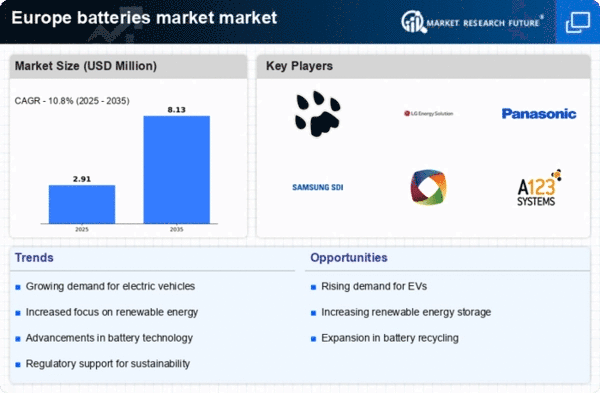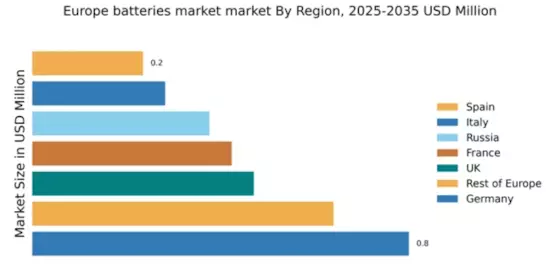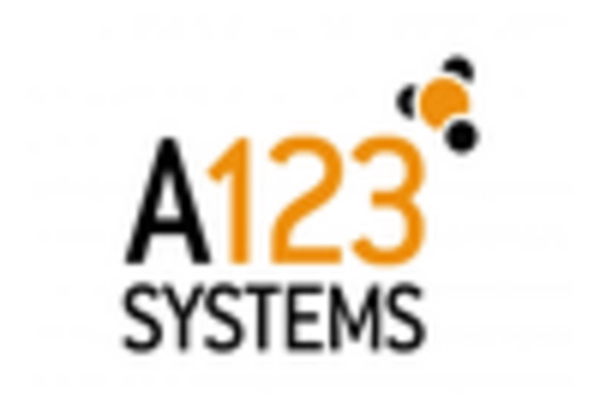Regulatory Support for Clean Energy
The batteries Market in Europe is experiencing a notable boost due to increasing regulatory support for clean energy initiatives. Governments across the region are implementing stringent regulations aimed at reducing carbon emissions, which in turn drives the demand for batteries. For instance, the European Union has set ambitious targets to achieve carbon neutrality by 2050, which necessitates a significant increase in battery production and usage. This regulatory framework not only encourages investment in battery technologies but also fosters innovation within the batteries Market. As a result, manufacturers are likely to focus on developing more efficient and sustainable battery solutions to comply with these regulations, thereby enhancing their market position.
Rising Demand for Renewable Energy Storage
The batteries Market in Europe is significantly influenced by the rising demand for renewable energy storage solutions. As the region transitions towards renewable energy sources, such as wind and solar, the need for efficient energy storage systems becomes paramount. Batteries play a crucial role in this context, enabling the storage of excess energy generated during peak production times for use during periods of low generation. According to recent data, the energy storage market in Europe is projected to grow at a CAGR of over 20% through 2030, indicating a robust demand for battery technologies. This trend is likely to drive investments in the batteries Market, as companies seek to develop advanced storage solutions that can meet the evolving energy landscape.
Expansion of Electric Mobility Infrastructure
The expansion of electric mobility infrastructure is a critical driver for the batteries Market in Europe. As cities and countries invest in charging stations and related infrastructure, the adoption of electric vehicles (EVs) is expected to rise significantly. This infrastructure development not only facilitates the use of EVs but also creates a corresponding demand for batteries, as they are essential components of electric mobility solutions. Recent reports indicate that the number of public charging points in Europe has increased by over 50% in the past two years, reflecting a strong commitment to supporting electric mobility. Consequently, this trend is likely to bolster the batteries Market, as manufacturers ramp up production to meet the anticipated demand.
Technological Innovations in Battery Manufacturing
Technological innovations are reshaping the batteries Market in Europe, leading to enhanced performance and reduced costs. Advances in battery chemistry, such as the development of solid-state batteries and improvements in lithium-ion technology, are paving the way for more efficient energy storage solutions. These innovations not only improve battery life and charging times but also contribute to the overall sustainability of battery production. The European batteries Market is witnessing increased investments in research and development, with companies striving to create next-generation batteries that meet the growing demands of various applications, including electric vehicles and renewable energy systems. This focus on innovation is likely to drive market growth and competitiveness.
Consumer Awareness and Demand for Sustainable Products
Consumer awareness regarding sustainability is increasingly influencing the batteries Market in Europe. As individuals become more conscious of their environmental impact, there is a growing preference for products that are eco-friendly and sustainable. This shift in consumer behavior is prompting manufacturers to prioritize the development of batteries that utilize sustainable materials and production processes. Market data suggests that over 70% of consumers in Europe are willing to pay a premium for sustainable products, which is likely to drive demand for greener battery technologies. As a result, companies within the batteries Market are expected to adapt their strategies to align with consumer preferences, fostering a more sustainable industry.


















